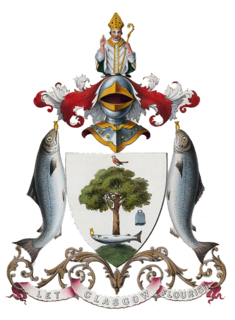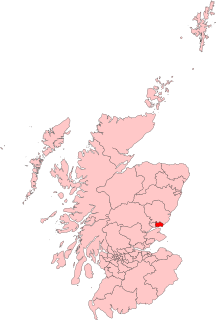
Glasgow City Council, the local government body of the city of Glasgow, Scotland, became one of the newly created single tier local authorities in 1996, under the Local Government etc. (Scotland) Act 1994, with boundaries somewhat different from those of the former City of Glasgow district of the Strathclyde region: parts of the Cambuslang and Halfway and Rutherglen and Fernhill areas were transferred from the city area to the new South Lanarkshire council area.
Local government in Scotland is organised through 32 unitary authorities designated as councils which consist of councillors elected every five years by registered voters in each of the council areas.
The Labour Party of Scotland was a minor Scottish nationalist political party that was active in the early 1970s. Formed as a left-wing breakaway from Dundee's branch of the Scottish National Party (SNP), it is perhaps best known for standing in the Dundee East by-election of 1973, where its interference split the nationalist vote and probably cost the SNP a parliamentary seat as a result. The party contested elections to Dundee City Council two months later but was ultimately unsuccessful. It folded soon after, and by early 1974 most of its membership had returned to the SNP, whose campaigns on North Sea oil were proving popular with Scotland's urban electorate. It never had any official political representation.

The Local Government etc. (Scotland) Act 1994 is an Act of the Parliament of the United Kingdom which created the current local government structure of 32 unitary authorities covering the whole of Scotland.
A provost is the ceremonial head of Scottish local authorities, and under the name prévôt was a governmental position of varying importance in Ancien Régime France.

Dundee East is a constituency of the House of Commons of the Parliament of the United Kingdom. Created for the 1950 general election, it elects one Member of Parliament (MP) by the first-past-the-post voting system.

Dundee West is a constituency of the House of Commons of the Parliament of the United Kingdom. It elects one Member of Parliament (MP) by the first-past-the-post voting system.
A burgh constituency is a type of parliamentary constituency in Scotland. It is a constituency which is predominantly urban, and on this basis has been designated as a burgh constituency. They are the successors of the historic parliamentary burghs of the Parliament of Scotland.
Scottish Westminster constituencies were Scottish constituencies of the House of Commons of the Parliament of Great Britain, normally at the Palace of Westminster, from 1708 to 1801, and have been constituencies of the House of Commons of the Parliament of the United Kingdom, also at Westminster, since 1801. Constituency boundaries have changed on various occasions, and are now subject to both periodical and ad hoc reviews of the Boundary Commission for Scotland.

Politics in the Dundee Citycouncil area are evident in the deliberations and decisions of Dundee City Council, in elections to the council, and in elections to the Scottish Parliament (Holyrood) and the House of Commons of the Parliament of the United Kingdom (Westminster).

Joseph Martin FitzPatrick is a Scottish National Party (SNP) politician serving as Minister for Public Health, Sport and Wellbeing since 2018 and Member of the Scottish Parliament for Dundee City West since the 2007 Scottish Parliament elections, succeeding retiring Labour MSP Kate Maclean. He also served as the Scottish Government Minister for Parliamentary Business, a post he held from September 2012 to June 2018.

Local elections were held in Scotland in May 1992, to elect members to all 53 district councils. It was the last local election held under the Local Government (Scotland) Act 1973, which had established the two-tier system of regions and districts. Regional and district councils were abolished in 1996, and replaced with 29 new mainland unitary authorities under the terms of the Local Government etc. (Scotland) Act 1994.

There were elections for the Scottish district councils in 1980.
The Dundee West by-election was held on 21 November 1963 due to the death of the incumbent Labour MP John Strachey. It was won by the Labour candidate, Peter Doig.

The 1992 City of Dundee District Council election took place in April 1992 to elect members of City of Dundee Council, as part of that year's Scottish local elections.

The 1999 City of Dundee District Council election took place on 6 May 1999 to elect members of City of Dundee Council, as part of that years Scottish local elections.
The 1974 City of Dundee District Council election took place on 8 May 1974 to elect members of City of Dundee Council, as part of that years Scottish local elections.
Elections for the Glasgow City District Council took place on 3 May 1977, alongside elections to the councils of Scotland's various other districts. These was the second election to the Glasgow City District Council, and saw Labour losing their control of the council, losing nearly half of their councillors. Among the losing councillors was Dick Dynes, the Labour group leader. Dynes was replaced as leader by Jean McFadden.

The 1992 Eastwood District Council election for the Eastwood District Council took place in May 1992, alongside elections to the councils of Scotland's various other districts.

The 1980 Glasgow City District Council election for the Glasgow City Council took place on 1 May 1980, alongside elections to the councils of Scotland's various other districts. These was the third election to the Glasgow City District Council.












